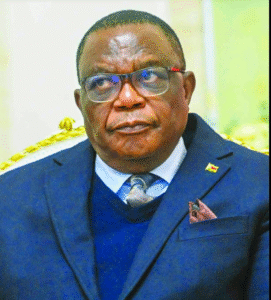MUTSVANGWA’S ATTACK ON MAHERE EXPOSES ZIMBABWE’S BROKEN BUDGET CULTURE
In an outrageous and undemocratic attack, War Veterans minister Chris Mutsvangwa recently declared that Fadzayi Mahere, the opposition CCC MP for Mount Pleasant, should not speak on Zimbabwe’s national budget. His reason? She is “not an economist.” But in making this claim, Mutsvangwa has exposed more than his arrogance—he has revealed everything that is wrong with Zimbabwe’s political culture and broken budget system.
Mutsvangwa’s statement is not only sexist and dismissive—it is dangerous. It promotes the idea that only a small elite can talk about how public money is used. That mindset is exactly why Zimbabwe is drowning in debt, mired in corruption, and locked in a cycle of bad governance.
Budgets are not sacred texts written by priests. They are public documents. They are about people’s lives—schools, clinics, roads, jobs, water, electricity. They affect every citizen, from the street vendor in Mbare to the teacher in Mutoko. That means every Zimbabwean has a right to question, to comment, and to challenge how money is raised and spent.
Mutsvangwa’s thinking is built on a lie—the lie that economics is a closed club for experts. But economics is not just about graphs and jargon. It is about how society uses its resources. It is deeply linked to politics, justice, law, business, health, and education. Economics is about decisions: who gets what, when, and how. And if those decisions are not open to the people, they become tools of oppression.
Mahere’s call for public scrutiny of the budget is not just valid—it is necessary. Zimbabwe has a long and painful history of budget abuse. The government repeatedly violates its own laws: the Public Finance Management Act is ignored, overdraft limits are breached, and debt ceilings are broken without consequence. Unbudgeted spending and shady deals continue, with zero accountability.
Corruption thrives in silence. When budget processes are kept away from the public, theft becomes easy. Deals are signed in secret. Projects are inflated. Ghost payments are made. No one knows how much is being stolen, because the people are not allowed to ask questions.
This is why participatory budgeting is essential. Around the world, governments that involve citizens in budgeting see better results. Communities know what they need. They understand where money should go. When people are included, public spending becomes more fair, more transparent, and more efficient.
But in Zimbabwe, politicians like Mutsvangwa want to shut the door. They want to keep control. They want to silence people like Mahere who dare to ask hard questions. That is not leadership—it is fear.
The truth is, Zimbabwe’s budget process has no credibility. It is a political tool, not a planning document. Every year, ministries overspend. Every year, officials break the rules. Every year, the same corrupt habits repeat. And when someone stands up and says “enough,” the response is insults and threats.
Zimbabwe needs a new approach. We need open budgets. We need public hearings that matter. We need MPs from all backgrounds to challenge ministers, ask questions, and protect taxpayers. We need citizens to take part, to demand answers, and to shape how their money is used.
In a real democracy, Mahere would be praised for her stance—not attacked. She is doing her job. She is asking the right questions. And she is reminding Zimbabweans that the budget is not for the politicians—it is for the people.
Mutsvangwa’s attack has backfired. It has sparked a necessary debate. And it has shown us why we must fight even harder for transparency, accountability, and real democratic participation.
Zimbabweans must not be silenced. The budget belongs to them. And no amount of political bullying will change that.



